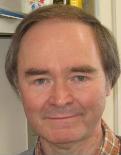Bernard Carr read mathematics as an undergraduate at Trinity College, Cambridge. For his PhD he studied the first second of the Universe, working under Stephen Hawking. He was elected to a Fellowship at Trinity in 1975 and in 1980 became a Senior Research Fellow at the Institute of Astronomy in Cambridge. In 1985 he moved to Queen Mary College, University of London, where he is now Professor of Mathematics and Astronomy. He has also held Visiting Professorships at various institutes in America, Canada and Japan. His professional area of research is cosmology and relativity – with particular interest in such topics as the early universe, black holes, dark matter and the anthropic principle. He has recently edited a book entitled Universe or Multiverse?, based on articles presented at three conferences sponsored by the Templeton Foundation. He also has a long-standing interest in the interface between science and religion, having recemtly contributed an article on cosmology and religion in "The Oxford Handbook of Religion and Science".
Selected publications
- Carr, B.J. & Rees, M.J. (1979) “The Anthropic Principle and the Structure of the Physical World”, Nature 278, 605-612.
- Carr, B.J. (1982) "On the Origin, Evolution and Purpose of the Physical Universe",1982, Irish Astron. J.,15, 237-252.
- Carr, B.J. (1991) "Anthropic Principles as Constraints on Cosmological Models", J. Brit. Interplan. Soc., 44, 63-70.
- Carr, B.J. (2000) “The Anthropic Principle”, in Encyclopaedia of Astronomy and Astrophysics, P. Murdin et al., IOP Publishing & Macmillan.
- Carr, B.J. (2004) “Mind and the Cosmos”, in Science, Consciousness and Ultimate Reality, ed. D.Lorimer, p 33-64, Imprint Academic Press.
- Carr, B.J. (2007) "Universe or Multiverse?", Cambridge University Press.
- Carr, B.J. (2008) “Cosmology and Religion”, in Oxford Handbook of Religion and Science, ed. P. Clayton and Z. Simpson, pp 139-155, Oxford University Press.
- Carr, B.J. and Ellis, G.F.R. (2008) "Universe or Multiverse?", Astron. Geophys. 49, 29-33.




